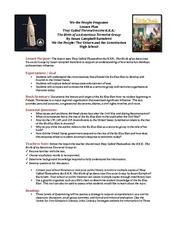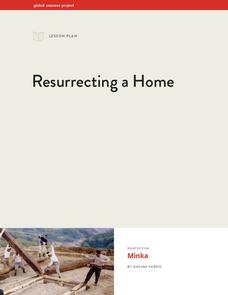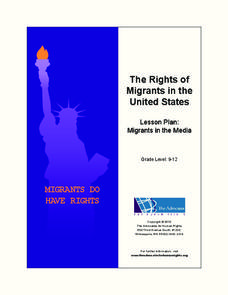Center for Civic Education
Citizenship Schools and Civic Education During the Civil Rights Movement and in the Present
Your young historians will discover the importance that citizenship education has played in the social progress of the United States as they learn about early efforts to discourage African Americans from voting in the 1960s.
Carolina K-12
African Americans in the United States Congress During Reconstruction
The Civil Rights Act of 1866, which granted citizenship to all males in the U.S., resulted in the first African Americans to be elected to Congress. Class members research 11 of these men, the challenges they faced, and craft...
Curated OER
The Called Themselves the K.K.K.; The Birth of an American Terrorist Group
How did Ku Klux Klan develop and flourish in the US? How did the government respond to acts of terrorism conducted by the KKK following the Civil War? How does the government respond to acts of terrorism today? This resource launches a...
Center for Civic Education
Constitution Day Rap
Engage your class while learning about the US Constitution with this fun primary grade social studies lesson. After viewing a picture of the US Constitution, young learners piece together a US flag using stars and stripes with facts...
Center for Civic Education
Matching Game with the US Constitution
In September we celebrate Constitution Day. Begin the celebration with a grand conversation about the US Constitution. Follow up the in-depth discussion with a learning game in which scholars match terms to images such as the...
Curated OER
Little House in the Census: Almanzo and Laura Ingalls Wilder
How would you use census data from 1880-1900? Here are a set of ways you can incorporate the book Little House on the Prairie and US census data from that time period. Learners will research the validity or the book based on factual...
Center for Civic Education
What Basic Ideas Are in the Preamble to the Constitution?
Introduce young historians to the US Constitution with this upper-elementary social studies lesson plan. Beginning with a general discussion about the role of government in society, students go on to work in small groups identifying and...
PBS
Jackie Robinson's Complicated — and Important — Legacy
Americans tend to lock their heroes in history, holding these icons to a particular event or time. Jackie Robinson is such a hero, remembered by most for becoming the first African American to play in the Major Leagues. Young historians...
Facing History and Ourselves
Many Voices, One National Identity
To conclude the unit on "Exploring Identity in the United States," pupils consider whether it is possible to combine many voices into one national identity. After creating an identity chart that lists words, phrases, and images that they...
Center for Civic Education
What Basic Ideas About Government Are Included in the Preamble to the Constitution?
Young historians explore the meaning of the Preamble to the US Constitution in this upper-elementary social studies lesson. Working with partners or in small groups, children discuss the purpose of government before reading and analyzing...
State Bar of Texas
Texas v. Johnson
If you saw a person burning an American flag, how would you feel? Scholars analyze the concept of freedom of expression and speech with the Supreme Court case Texas v. Johnson. A short video clip creates open discussion in pairs on the...
iCivics
Wanted: A Just Right Government
What type of government did American colonists gain and seek after gaining their independence after the Revolutionary War? Here is lesson that will guide your young learners through the new nation's progression from the Articles of...
State Bar of Texas
Schenck v. US
Freedom of speech is absolute—or is it? The Supreme Court case Schenck v. United States has learners research what free speech really looks like. A short video along with paired work creates open discussion and thought on what speech is...
Global Oneness Project
Resurrecting a Home
Davina Pardo's documentary Minka asks viewers to consider that value of preserving traditional dwellings and traditional building techniques by examining how American journalist John Roderick and Japanese architect Yoshihiro Takishita...
State Bar of Texas
White v. Regester
One vote doesn't really matter, right? Class members investigate the concept of voter rights and restrictions using the 1973 Supreme Court case White v. Regester. They view a short video and work in pairs to analyze how people create...
Curated OER
Patriotic Symbols of the United States
Young historians take a close look at the most famous patriotic symbols of the United States and determine what they actually stand for. Symbols such as Uncle Sam, The Statue of Liberty, The Bald Eagle, and The Liberty Bell are studied....
PBS
Evolution of the Presidency: Theodore Roosevelt to Franklin D. Roosevelt
How much power should a president be allowed to exert? Theodore Roosevelt and Franklin D. Roosevelt exercised their power according to their interpretations of the United States Constitution, and these interpretations affected the...
PBS
President Theodore Roosevelt: Foreign Policy Statesman or Bully?
Can a negative perception of a president's foreign policy harm his or her historical legacy? A project that winds the clock back to the date of Theodore Roosevelt's death puts students at the editorial desk of a fictional newspaper....
University of Arkansas
Promises Denied
"Promises Denied," the second instructional activity in a unit that asks learners to consider the responsibilities individuals have to uphold human rights, looks at documents that illustrate the difficulty the US has had trying to live...
Alabama Department of Archives and History
Alabama's 1901 Constitution
"We, the People of the State of Alabama. . ." Did you know that the Alabama State Constitution has 357,157 words while the US Constitution has only 4,400? And that it has 798 amendments while the US Constitution has 27? Class groups...
Rutgers University
How the Allies Won World War II: Island-hopping in the Central Pacific
Using primary source documents, young historians explore the strategies the US used to defeat Japan during WWII. They also learn about the American military experience, and innovations that changed the style of warfare. High schoolers...
Advocates for Human Rights
Migrants in the Media
Class members examine two documents—The Universal Declaration of Human Rights and The Rights of Migrants in the United States—and then use reports in the media to assess how well the US is doing in ensuring these rights.
John F. Kennedy Presidential Library & Museum
Analyzing the Inaugural Address
Get high school historians to step outside their own shoes by responding to JFK's inaugural address from the perspective of a civil rights activist, a soviet diplomat, or a Cuban exile. After a class discussion about the address, the...
State Bar of Texas
Brown v. Board of Education
You walk each day over 20 blocks to school as a 9-year old because the color of your skin does not allow you to attend a school in your own neighborhood. Scholars use the 1954 Supreme Court case Brown v. Board of Education to investigate...

























